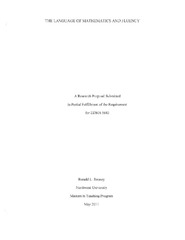The Language of Mathematics and Fluency
Abstract
The problem of mathematics avoidance in the United States has a massive effect on how students can compete with students of other nations in a world economy. This problem may have it roots in the attitudes toward and difficulties in learning a second language, prevalent in American culture. This project used a conceptual methodology to consider the relationship of mathematics as a language and its relationship to mathematics avoidance and anxiety. Specifically, philosophical inquiry was used to probe the concept of mathematics as a language and unpack ideas surrounding the definition of fluency. The study compared the philosophies of the original authors of mathematic language and contemporary philosophy of linguistics to further understand the dynamics and assumptions behind the idea of fluency in language and its relationship to the language of mathematics. The study concluded that the current definition of fluency in mathematics was not adequate to account for the necessities of learning the meta-language of mathematics. Fluency should be defined as the ability to express abstract thought, principally communicated through discourse, and create meaning through the use of grammar and prior knowledge. The lack of fluency and elements of mathematical discourse at the elementary, middle school and junior high school level contributes to the prevalence of mathematics avoidance.
Original item type
PDF
Original extent
iv, 49 pages
Subject
Copyright
This original work is protected by copyright. Copyright is retained by the author(s). Works may be viewed, downloaded, or printed, but not reproduced or distributed without author(s) permission.


 Maintained by the Northwest University Library
Maintained by the Northwest University Library